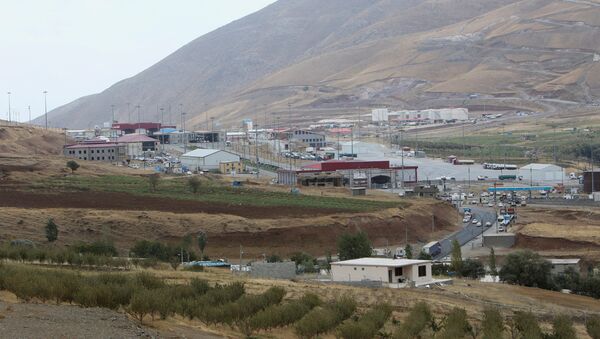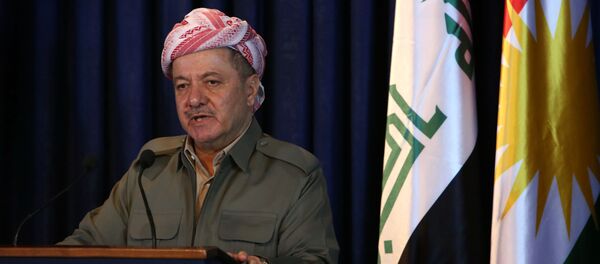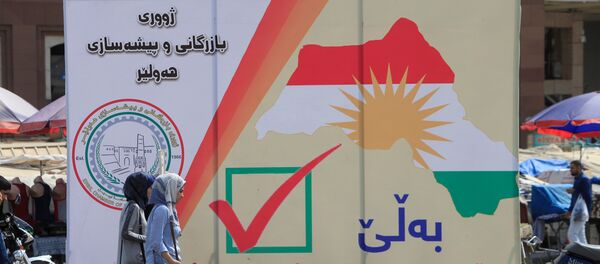MOSCOW (Sputnik) — Representative of the Kurdistan Democratic Party (KDP) Hoshawi Babakr has told Sputnik that following Iraqi Kurdistan President Masoud Barzani's decision not to extend his duties expiring on November 1, the presidential election in the region would take place simultaneously with the parliamentary ones.
On October 29, 71-year-old Barzani officially refused to extend his duties.
READ MORE: Iraqi Kurdistan's President Will Not Run for Next Term — Reports
Previously both presidential, as well as parliamentary elections, were slated for November 1, however, the crisis after the September 25 independence vote forced the authorities to postpone elections.
"There will be no acting [president]. The prime minister is in charge now. At the moment, the power has been transferred to the government of Kurdistan. There is a list of [presidential] powers, which are being redistributed among ministries and the prime minister. For example, the Ministry of [Kurdish militia] Peshmerga Affairs will have more powers," Babakr said.
According to the party's representative, Barzani will remain the leader of KDP, but is unlikely to participate in the upcoming election, adding that the president had promised in the past that neither he, nor his family members would run in the next election, as he has grown weary while in office.
READ MORE: Iraqi Kurdistan Outgoing President Vows to Continue Fight for Kurds' Rights
"I see his face, he has changed a lot. This is not some joyful office, [president] in Kurdistan. Maybe, this position is more interesting in other countries, has more perks," Babakr noted.
Hoshawi Babakr also underlined that the decision of Barzani, who has been the leader of the autonomous region since 2005, to step down would help to unite opposing political forces in the regional parliament.
"The parliament's session was held with all [parties] in attendance, Gorran [opposition party, also known as Movement for Change] also took part. That is why, this [Barzani's resignation] is a positive step toward the reunification," Babakr said.
According to Babakr, Gorran should get back the ministerial positions its representatives held in the past and the Ministry of Peshmerga Affairs should work on uniting all of its subdivisions, as many brigades currently listen to party leaders rather than the central command.
Opposition Parties HQs Attacked in Kurdistan After Barzani's Resignation
According to the representative of the Kurdistan Democratic Party, the headquarters of Iraqi Kurdish opposition parties Gorran and the Patriotic Union of Kurdistan were attacked in the northern Iraqi city of Zakho on Sunday.
"The offices of the Patriotic Union of Kurdistan and the Gorran in the city of Zakho, which borders Turkey [were targeted]. People were perturbed and took to the streets," Babakr said.
The clashes started on the day Iraqi Kurdistan President Masoud Barzani announced his resignation. The Gorran party urged its supporters to refrain from taking actions against the ruling KDP following the incidents.
Baghdad, Kurds Observe Ceasefire in Iraq
Commenting on the ceaseifre between the Kurdish militias and the Iraqi army, Babark said that it is being respected by both sides.
"The hostilities have been suspended," Babakr said.
The statement comes several days after Iraqi Prime Minister Haider Abadi ordered a 24-hour suspension of military operations in the country's north to enable the deployment of federal forces in all disputed areas and along the country's borders. Since then, the ceasefire regime has been extended.
Barzani to Influence Political Decisions After Leaving Iraqi Kurdistan Presidency — Adviser
Sputnik has also spoken with Kifah Sinjari, an adviser to the Kurdish leader, on Barzani's resignation. According to the adviser, Barzani will keep influencing political decisions in the autonomy.
"He will certainly influence. He is the national leader, not only for the Iraqi Kurds, but for all Kurds in other regions of Kurdistan. He has a rich history of fighting, both armed and political, and he will remain the national political authority in all political processes," Sinjari said.
International Reaction
The United States has welcomed the decision by Iraqi Kurdistan’s president not to seek another term in 2018.
"The United States commends the decision of Masoud Barzani not to seek an additional term as President of the Iraqi Kurdistan Region and the vote of the Iraqi Kurdistan Parliament to distribute presidential authorities to other Kurdish Regional Government (KRG) institutions," US Department of State spokeswoman Heather Nauert said in a statement.
The US Department of State has also urged all Kurdish parties to support the Kurdistan Regional Government (KRG), as it works to resolve pending issues over the remainder of its term and prepare for elections in 2018.
"The United States now looks forward to engaging actively with the Prime Minister of the Kurdistan Regional Government, Nechirvan Barzani, and the Deputy Prime Minister, Qubad Talabani," Nauert stated. "A strong KRG within a unified and federal Iraq is essential to its long-term stability and to the enduring defeat of ISIS [Daesh terror group, outlawed in Russia]."
Washington also called on both Bagdad and Erbil under the new leadership to urgently work to resolve pending issues under the Iraqi constitution.
"We also continue to support the strong leadership of [Iraqi] Prime Minister Abadi as he works to ensure the total and enduring defeat of ISIS [Daesh] and a stable Iraq after ISIS. We welcome the recent decision from Prime Minister Abadi to begin a new dialogue with the KRG, under the Iraqi constitution, and avoid further confrontations."
Barzani is believed to be the main actor of Iraqi Kurdistan's independence vote, which is considered illegal by Iraq. Over 90 percent of 3.4 million people in northern Iraq's three main Kurdish provinces and in multi-ethnic Kirkuk region voted to have a separate state.
The referendum resulted in the military operation conducted by Iraqi government forces and Kurds losing administration and oilfields in the disputed Kirkuk province.




